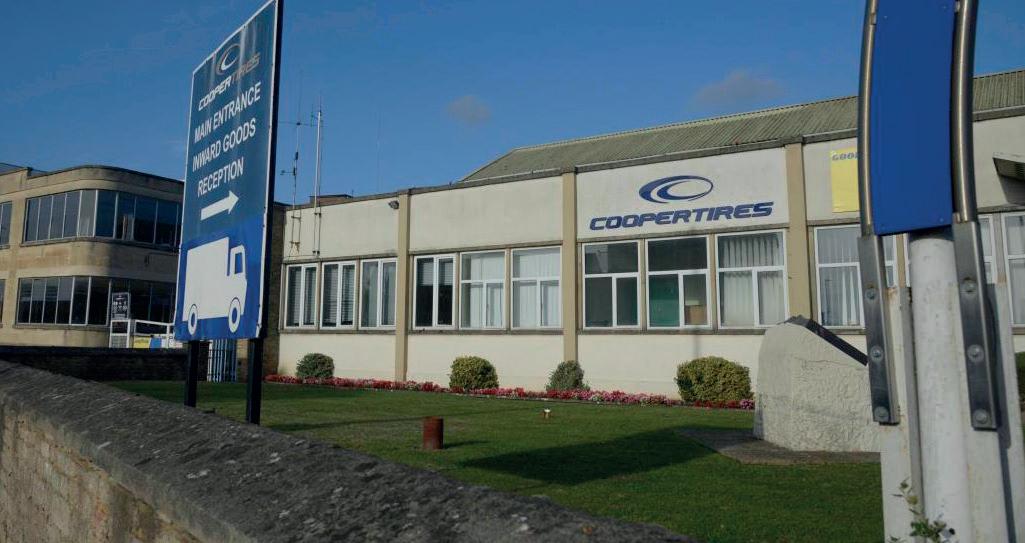
4 minute read
Avon Tyre factory to close
Business news
Avon tyre factory to shut
The European arm of US manufacturer Cooper Tire & Rubber – which became a Goodyear subsidiary in June 2021 – is to close down its plant at Melksham in Wiltshire by the end of 2023 after 132 years of production. The factory currently makes only Avon-branded motorcycle and motorsport tyres and is the last remaining bike tyre production facility in the UK.
Cooper has begun a compulsory consultation process on the proposed closure, involving 350 employees who now face redundancy and their relevant representative bodies. Previous cutbacks at the site in 2018 transferred car and SUV tyre output from Melksham to elsewhere in Europe, with the loss of 300 jobs.
At that time, Cooper Tire Europe general manager Jaap van Wessum assured bike trade customers they had nothing to worry about. “We plan to keep the production of Avon motorcycle tyres in Melksham and may have the opportunity to grow this business,” he said. However, Cooper parent Goodyear approved a plan to streamline its global administrative structure in the second quarter of 2022. The final demise of tyre production in Wiltshire is almost certainly associated with such an aspiration. Gavin Champion, HR director at The Cooper Tire & Rubber Company, Europe, commented, “It is with deep sadness that we have announced our intention to begin a consultation process on the proposed closure of our tyre production facility at Melksham.
“Our Melksham site has struggled to be competitive for some considerable time, and everyone involved has worked extremely hard to keep operations going for as long as possible. However, this has become increasingly challenging in the current business environment.”
Avon has a venerable history. Founded in 1885, occupying a former cloth mill on the banks of the River Avon, it moved to Melksham in 1890 and became the Avon India Rubber Company. Production of pneumatic tyres for automotive purposes began in 1904. The tyre business was sold to Cooper in 1997.

End of the road for Irish show
Sad news from Dublin, where the organiser of the Irish Motorbike and Scooter show confirms that it is giving up the running of the show. Organiser Ruth Lemass, told BDN that the team has made the decision to end the show and blames several factors including Brexit and the Covid-19 pandemic, as well as rising inflation.
The show had run for 20 years at the Royal Dublin Society campus in Dublin and had welcomed more than 300,000 bikers over the years.
“It has been a great privilege to be involved in such an important part of our motorcycle community here in Ireland and further afield,” said Lemass. “I relished my role as the organiser of what I am sure most will agree was a muchloved event by the tens of thousands of people who either participated or attended the event at the RDS over the last twenty years.” 4 NOVEMBER 2022
NMC opposes net zero cliff-edge plans
IT MUST BE A THANKLESS TASK WORKING in Westminster at the moment. But all credit to the National Motorcyclists Council, which has been tirelessly representing motorcycling to a UK government that has been beset by problems all year.
Last month, the NMC made its representation to the Department for Transport’s consultation on the decarbonisation of motorcycles. That consultation has been running since late summer and ended on 21 September. The DfT seemed to be heading towards a plan where all sales of new non-electric bikes would be phased out by 2035, with 50cc and 125cc equivalent petrol bikes ending five years earlier, by 2030.
The NMC’s stance has been set out before, so its response holds few surprises. While backing the general aim of cutting CO2 emissions, it opposes the cliff-edge plans outlined. It points out that there is no immediate alternative in much of the largecapacity motorcycle sector. Instead, the NMC wants the UK government to take a technology-neutral approach, looking at alternatives like bio-fuels, hydrogen power and other options. It also says that an arbitrary, UK-only date will seriously handicap the industry in this country and urges the government to adopt globally agreed targets instead of its own local schedule. It points out the low CO2 outputs of most motorcycles, especially modern small-capacity machines. Finally, it also reiterates the need to consider existing petrol-powered machinery, including classic and heritage vehicles, to ensure that these bikes aren’t lost or rendered unusable.
NMC executive director Craig CareyClinch said: “Successful transition in any field requires those affected to be content with changes proposed. In the case of zero emission motorcycles, particularly in the premium motorcycle market, current product availability, its suitability for the wide range of rider needs, prices, and current low market penetration suggests that much more will need to be done before a reasonable target date for full zero-emission new production can be established.
“Although riders are willing to try new technologies, if products don’t meet their needs the market will be severely impacted. Therefore, it is clear that a different regulatory approach will be needed to recognise where electrification works for the market and where it currently poses challenges that cannot be ignored.
“The government should show more ambition in this area. Net zero should not mean the end of the internal combustion engine, but instead we should be looking towards a ‘mixed’ economy of battery electric, clean ICE fuels and other types of technology, with current motorcycle types properly recognised from now as a lower CO2 transport choice. Innovation should be encouraged and not restricted to narrow pathways.”










